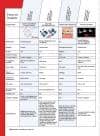Researchers from the University of Tennessee Health Science Center have found that adhesive precoated brackets did not have any reduction in enamel-adhesion properties up to 4 years after their expiration date.
The researchers set out to evaluate adhesive performance in terms of debonding forces of precoated metal and ceramic brackets 4 years after expiration.
They etched buccal and lingual surfaces of embedded extracted maxillary premolars with 34% Tooth Conditioner Gel (Dentsply Caulk), which were then rinsed and dried. Transbond MIP (3M Unitek) was applied prior to placing adhesive precoated brackets (APC II Victory stainless steel and APC Plus Clarity ceramic brackets, 3M Unitek). The preexpiration brackets had 29 to 35 months before, and the postexpiration brackets were 45 to 52 months past, their expiration dates. Sample size was 17 to 21 per group. The researchers determined debonding forces by subjecting the bonded brackets to a shear force in a universal testing machine. Debonding forces were compared using two-way ANOVA. Debonded surfaces were then examined under a stereomicroscope to determine failure modes, which were compared using the chi-square test.
The researchers found no statistically significant difference in debonding forces (P ?=? .8581) or failure modes (P ?=? .4538) between expired and unexpired brackets. Metal brackets required statistically significantly higher debonding forces than did ceramic brackets (P ?=? .0001). For both expired and unexpired brackets, failure modes were mostly cohesive in the adhesive layer for ceramic brackets, and mixed between adhesive and cohesive failure in the adhesive layer for metal brackets.




